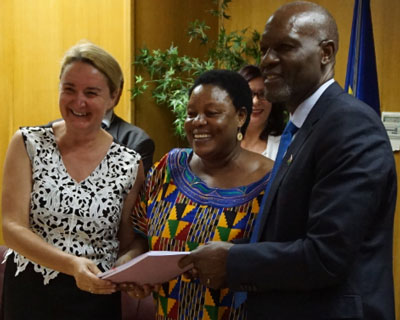
EU avails funds for Pre-Primary Education

6 December 2016 – The Delegation of the European Union to Namibia and the National Planning Commission on Monday signed a Financing Agreement worth N$400 million aimed at supporting Early Childhood Development and Pre-Primary Education over a period of four years.
According to the EU in a statement, it has now become a priority to reduce the high dropout rate during primary education, to increase retention in grade 1 and to improve overall learners’ academic performance.
The EU said the budget support will go to improving children’s access to Early Childhood Development facilities and/or services, expanding the number of pre-primary classes across the country and growing the quality of care and teaching at the early stages of education.
The EU delegation said, a total amount of EUR7.2 million will be disbursed over the years including three varying portions each up to EUR5.6 million for a total amount of EUR16.8 million. Annual disbursements will take place after the joint annual sector review, scheduled in June every year, to assess overall implementation progress and meeting of specific disbursement triggers.
In the statement, the EU said, the main responsibility for the implementation of the programme lies with the Ministry of Education and Ministry of Gender Equality and Child Welfare, which will be supported by the selected technical assistance team. The Ministry of Education, Arts and Culture and the Ministry of Gender Equality and Child Welfare will also receive a portion of the funds for capacity development.
“The programme was designed in partnership between the Government and the European Union and it is funded under the 11th European Development Fund. The European Union has been a long standing partner of the Government in the Education Sector. It has provided budget support and technical expertise for 15 years,”the statement said.
Furthermore, the union said, Early Childhood Development and Pre-Primary Education are universally recognised as being beneficial to the subsequent performance of children in basic education programmes.
“They lay the foundations for acquiring basic literacy and numeracy skills. When well managed, they generate a predisposition for successful school attendance and life-long learning,” the EU said.










































